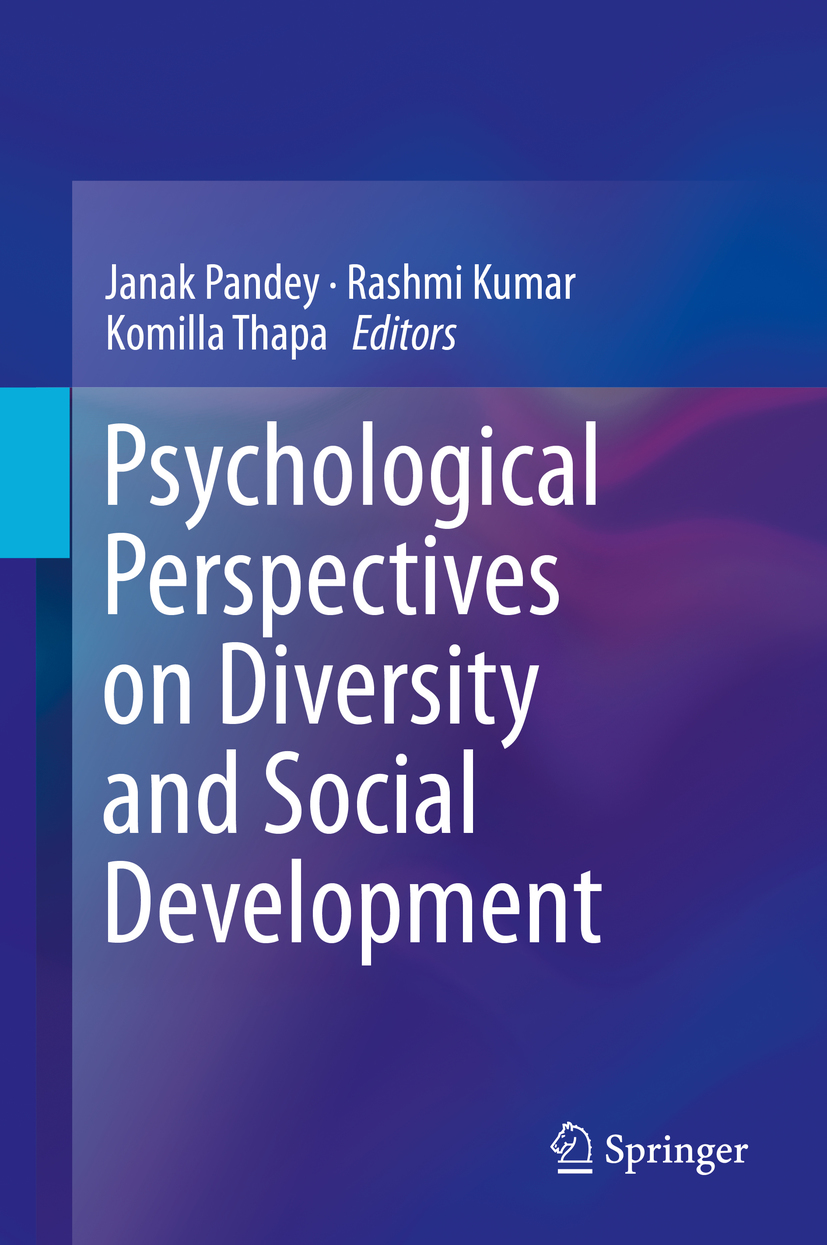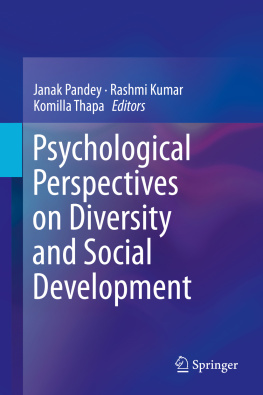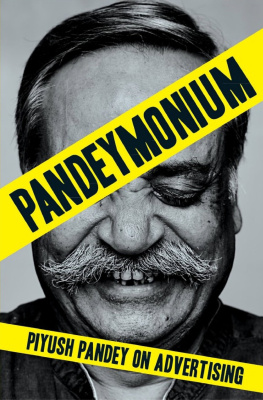Janak Pandey - Psychological Perspectives on Diversity and Social Development
Here you can read online Janak Pandey - Psychological Perspectives on Diversity and Social Development full text of the book (entire story) in english for free. Download pdf and epub, get meaning, cover and reviews about this ebook. year: 2019, publisher: Springer Singapore, genre: Politics. Description of the work, (preface) as well as reviews are available. Best literature library LitArk.com created for fans of good reading and offers a wide selection of genres:
Romance novel
Science fiction
Adventure
Detective
Science
History
Home and family
Prose
Art
Politics
Computer
Non-fiction
Religion
Business
Children
Humor
Choose a favorite category and find really read worthwhile books. Enjoy immersion in the world of imagination, feel the emotions of the characters or learn something new for yourself, make an fascinating discovery.
- Book:Psychological Perspectives on Diversity and Social Development
- Author:
- Publisher:Springer Singapore
- Genre:
- Year:2019
- Rating:3 / 5
- Favourites:Add to favourites
- Your mark:
- 60
- 1
- 2
- 3
- 4
- 5
Psychological Perspectives on Diversity and Social Development: summary, description and annotation
We offer to read an annotation, description, summary or preface (depends on what the author of the book "Psychological Perspectives on Diversity and Social Development" wrote himself). If you haven't found the necessary information about the book — write in the comments, we will try to find it.
Janak Pandey: author's other books
Who wrote Psychological Perspectives on Diversity and Social Development? Find out the surname, the name of the author of the book and a list of all author's works by series.
Psychological Perspectives on Diversity and Social Development — read online for free the complete book (whole text) full work
Below is the text of the book, divided by pages. System saving the place of the last page read, allows you to conveniently read the book "Psychological Perspectives on Diversity and Social Development" online for free, without having to search again every time where you left off. Put a bookmark, and you can go to the page where you finished reading at any time.
Font size:
Interval:
Bookmark:


This Springer imprint is published by the registered company Springer Nature Singapore Pte Ltd.
The registered company address is: 152 Beach Road, #21-01/04 Gateway East, Singapore 189721, Singapore
Dedicated to
Professor Rama Charan Tripathi
for his distinguished contributions to understanding
Social diversity and development
for building an inclusive and just society.
Psychological Perspectives on Diversity and Social Development is appearing at a time when diversity is being perceived as a threat to development, particularly to social development. Diversity in fact is a valuable resource for development. It is a natural part of human beings. No two individuals are alike, except identical twins. Individuals and the groups and communities that they form possess unique information, ideas, insights, skills, experiences, and so on. They pool them together to structure systems, norms, and values and perform functions for their mutual benefits, living harmoniously and enhancing well-being. Thats how they have developed civilizations and cultures and have been ascending on a growth trajectory. What has been happening simultaneously since the beginning, but is happening more conspicuously now, is that individuals and their groups also compete for valuable material resources and dominance that can enable them to claim disproportionately greater access to valuable resources. In the process, they see some others as adversaries and rivals evoking real or imagined threat perception to their own interests. They look for bases on which they can identify those posing a threat and tend to take them out of their way. It is here that social diversity comes in handy. It is easy to differentiate and target others by distancing, denigrating, discriminating, and depressing them. They cover up their motif by an ideology or some high-sounding words that they think can justify their behaviour. Only a few from them carry on their tirade to extreme actions and violence. But they do so generally because of tacit support that they get from the rest of them.
It has so happened that the balance between the twosharing and cooperating versus competing and conflictingapproaches to different-than-self and own group people has been tilted in favour of the latter because of the nature of the worldview that is being globalized now. In this worldview, material affluence is the most valued goal. Individuals and groups compete with, outwit, and surpass others. They are the successful people deserving power and position in the society. They are the role models that the rest of the people emulate. However, fewer and fewer entrepreneurial individuals and groups in this race are able to acquire, hoard, monopolize, and misuse resources to make a fortune and show it as the nations affluence and political clout. They are too involved in their achievement to be sensitive to others or to have any empathetic appreciation of those with whom they are competing. Rather, they are more inclined to identify different and gullible ones who can be used and misused. It is a social arrangement that is exclusive by its nature and designed to create wealth, but not to bother for human well-being. So, the threat to inclusive development is real and has to be addressed at two levels. First, a strong advocacy for the superiority and ethical merit of inclusive development for human well-being over the exclusive one primarily for wealth creation has to be initiated. There is nothing wrong in creating wealth, but it has to be done with the participation of all by ensuring equitable allocation of resources and allowing equal opportunity to access them. The new design for development will provide an ideational ground for making deliberate efforts to tilt the balance in peoples approach from competing and conflicting to sharing and cooperating with diverse individuals and groups.
Psychologists have an expertise in both domains. They have been working on individual differences and group dynamics and have shown how individuals and groups can be enabled to build bridges across contriently dependent individuals and groups in realizing superordinate goals. I am pleased to see that the present volume deals with or refers to most of the concepts, processes, methods, theories, strategies, and techniques, which are available in psychological literature. They are a rich source for working with other policy scientists to come up with viable alternatives to the existing framework of making policy decisions and taking actions accordingly. Professor R. C. Tripathi, along with his associates, has been preparing the ground for this kind of endeavour for the last several decades. In the late 1980s, he proposed to align social development to the values of embeddedness and openness. Individuals, he argued, need to be embedded in their natural collectives in order to realize their unique potentials. The collectives, as a result, become diverse. However, if individuals are simultaneously open to other individuals and groups needs, expectations, hopes, and fears, the diverse collectives would form overlapping networks for generating social energy for mutual benefits and well-being. His recent work on how othering people of a different community objectifies them, rendering them vulnerable to be mistrusted and mistreated. His contributions to this area are the source of inspiration to psychologists. It is appropriate that the volume is dedicated to Professor R. C. Tripathi. I wish that he keeps leading psychologists through research and actions and plays an effective role in facilitating social development by showing that diversity is a valuable resource for social development and human well-being.
Font size:
Interval:
Bookmark:
Similar books «Psychological Perspectives on Diversity and Social Development»
Look at similar books to Psychological Perspectives on Diversity and Social Development. We have selected literature similar in name and meaning in the hope of providing readers with more options to find new, interesting, not yet read works.
Discussion, reviews of the book Psychological Perspectives on Diversity and Social Development and just readers' own opinions. Leave your comments, write what you think about the work, its meaning or the main characters. Specify what exactly you liked and what you didn't like, and why you think so.











